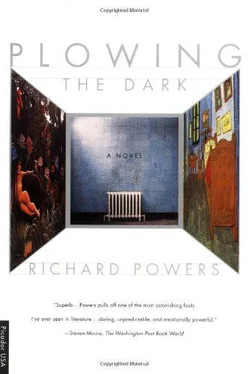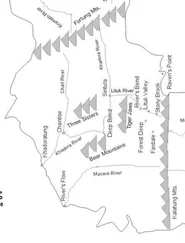Jackie begged his father to get a terminal at home. Thereafter, whole days passed, unmarked except for the ghostly pencil lines spreading across his expedition's graph-paper map. He spent days in a blocked gallery, dislodging himself in a rush, on an aha, a dream inspiration as exhilarating as anything life had to offer. Freed up for further caving.
And while he collected his crystal rods, his gems the size of a plover's egg, his journey pushed forward on another plane, down channels more wonderfully insidious. The quest for arrival, for the perfect score, left him tunneling through a maze of chambers with passages leading off in all directions, filaments no more than a fraction of a
micron thick.
Know what? That program taught me how to type. The voice from behind Jackdaw shocked him out of the network relay chat. Spider, eyes closed, cheek to the cushions, playing ventriloquist in his own throat, exercised that Vulcan mind link he enjoyed with anyone stroking a keyboard within a twenty-meter radius.
Jackdaw nodded, his gesture invisible. That program taught me how to hack the operating system. Huh?
Serious. I started by learning how to do a hex dump of the game file, peeking into its guts for any text strings that might give me a clue. Anything to nail down another twenty points. Then I taught myself assembly language so I could disassemble the entire program. Follow the logic. Finally see how to beat it.
Oh sure. I tried that too. Only I got sidetracked somewhere in the ALU. Hooked by exactly what was happening in those registers when they added the contents of two memory addresses. Somehow forgot all about the sleeping dragon and his damn Persian carpet.
But Jackdaw had not forgotten. Nor had any of these eighty-six users scattered around the eastern Pacific rim. A distributed horde of boys attacked the cave with a fierce single-mindedness that mathematicians reserve for intractable proofs. They exchanged clues by electronic bulletin board, by satellite uplink, posting their discoveries through their technocrat fathers' primitive e-mail accounts. They formed clubs, networks of the estranged and ludicrous, their memberships only waiting to inherit a future they knew to be solely theirs…
Anyone ever figure out the Hall of Mists?
Anybody else still have his back issues of *Spelunker Today*?
An incalculable expenditure of time. A colossal waste of his life's potential. And yet Jackie's life: the vapor trail of narrative left simply from playing the game. Time-sharing, pirating, paying out extortionate prices to secure each spin-off, each latest extension to the great underground empire, the next, hot upgrade of the ongoing adventure, each more tantalizingly realized than the last. Worlds with a two-thousand-word vocabulary, then four thousand, then eight. Interactive novels that grew to parse whole sentences. Places where glass bottles broke and food molded. Where trees could be cut down and formed into planks or paper, boats or battlements. Lands where your accumulated actions changed your own stamina and strength and wisdom, where these changing numbers altered the further paths allowed you. Lands that allowed actions and responded in ways that surprised their very programmers.
Inevitably, there arose graphics. At first the pictures were a rush, each panorama ever more glorious than the last. But the pretty picture adventures came, within a year or two, to sadden Jack past saying. He could not explain it, explanations only saddening him all the more. Some richness, some open-endedness had been crushed under the inescapable visible.
His father sympathized. "I felt the same way when TV killed off radio. Hearing about creatures from the eighth dimension beat having to look at them." His father's wisdom rating had somehow soared in the years since Jack was a kid.
Whatever else they spoiled, graphics threw open portals all their own. The visual interface launched habitations faster than anyone could click through them. Any eleven-year-old who'd ever touched a video game was way out in front of the scientists on that score. Scientific visualization was born in the first wave of Space Invaders.
They came in rapid succession, games neither adventure nor role-playing, creatures unique to this infant medium. The sandbox games, with their feedback growth and their open-ended tool chests. The God games, with no victory except survival, no goal but to steep yourself in ever more elaborate playing.
Adolescent Jack governed his own surging metropolises. He assembled whole Utopian societies of shifting, conflicting needs. He hauled hops across the British Midlands, returning to London with trainloads of finished beer. He nursed branching ant colonies and interplanetary mining enterprises. He hired quarrymen and masons and carpenters to build him a castle that allowed him to cultivate the surrounding countryside, then tax it for every turnip he could squeeze out of it.
He sailed his sloops and pinnaces around the Caribbean, raiding Nevis and St. Kitts, buttressing the economy of Curaçao. He trained botanists and missionaries and game hunters and sent them up the Nile in makeshift canoes. He brought a peace-loving subcontinental Stone Age tribe up through the Renaissance, into the Industrial Revolution, and on into space. Then he repeated the journey in another neck of the random earth, spewing carnage and mayhem as he advanced.
He spent his teens alone, sealed in his bedroom, voyaging. All the while, he held on to that first hint, hoping to locate the fecundity that he'd wrongly thought already inhabited that first adventure. Each new release, each innovation in design, produced in him the sliver of recovery. But Closer only stoked the fire of Not Quite.
Life's turn-based game led Jack Acquerelli into programming, less to make ends meet than to bring about those playgrounds that did not yet exist. College provided him with the silicon sandbox of his dreams. He worked alone and in teams, the line between the two progressively blurring. He collaborated with coders he never met, people he wouldn't have known had he passed them on the street, guys who went by tags like SubClinical, TopX, and BotTot. He built his share of dungeon crawls, each populated with increasingly more anatomically correct homunculi. He helped write a primitive multiuser talk channel, code that allowed his fellow undergrad designers to collaborate at all hours and paved the way for multiplayer spaces.
His senior honors project was called Development, a resource management game with a twist. Randomly generated world maps laid down reserves of various resources — coal, iron, gems, and soil. The Hittites, Cretans, and Phoenicians of this archaic Earth set to the usual task of discovering, extracting, and refining the hidden treasure, then selling off the finished goods. The capital they amassed they plowed back into new technologies, new levels of goods created from out of the storehouse of further raw finds.
But then came Jack Acquerelli's special contribution to smart games. The available research paths — the papyrus you could press from your fibers, the metals you could smelt from your coal and ore— varied from game to game, depending upon the proficiency and research of the pursuing tribe. All skills expanded, contingent on their honing. No two races ever followed the same path. No two games of Development ever developed the same way. And of course — the holy grail of strategy gaming — no session of Development ever needed to end. It could spin itself out forever, unpredictably, to any of an infinitude of never-to-be-reached outcomes.
In the spirit of the digital age's gift economy, Acquerelli gave his masterpiece away, free for the downloading. The cheaper the game, the more players it gathered. And the more players that played, the more ingenious the strategies. Strategies proliferated, each one a complex program in its own right. And the more unanticipated strategies that poured into his game, the closer Jackdaw came to that sense of total liberty he hadn't felt since the age of eleven.
Читать дальше












